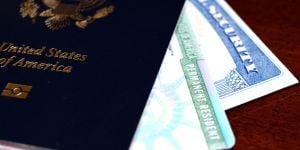
Expats who are in a relationship often want to bring their partner or spouse to the country where they are working. In some countries, this is a fairly straightforward process, but unfortunately, other countries have more stringent requirements like a minimum income threshold, age, or the number of years living together. Expats in same-sex relationships might also struggle to bring their partner to a country where same-sex marriage is not recognized.
Same-sex couples might not be eligible for family reunification in multiple countries
In 2023, there are 32 countries where same-sex marriage is legal. It includes most of North America and Europe, Australia, New Zealand, and a large part of South America, but alas, few countries in the Middle East, Asia and Africa. On the last two continents, it's only in Taiwan and South Africa that expats in a same-sex couple can obtain a spouse/partner visa through the normal route.
Don't despair, though! In some countries where same-sex marriage isn't federal law, a few regions might still recognize these unions or at least be willing to grant another kind of residence permit to same-sex partners of working expats.
For instance, in China, it's only the capital of Beijing and the autonomous region of Hong Kong that can grant a sort of “spousal visa” to the same-sex partner of an expat. In Beijing, the partner is granted “dependent resident status.” In Hong Kong, there is the “prolonged visitor visa” for “de facto spouses.” The big downside of these equivalents is that they don't grant same-sex partners all of the same rights that opposite-sex partners on a regular dependent visa enjoy. For instance, in Hong Kong, the “de facto spouse” cannot work without special permission from the Immigration Department, while an opposite-sex partner can. He/she must also renew the “prolonged visitor visa” every 6 months.
In Japan, another Asian country that technically doesn't recognize same-sex marriage, expats' same-sex partners have nevertheless slowly started being granted dependent visas. This happens if same-sex marriage is legal in their country of origin and their embassy/consulate is able to defend their case. Kyodo News reports that this is how 93 expats were able to bring their same-sex partners to the country between 2013 and 2020.
Unfortunately, in countries where such loopholes are not available, the expat's partner will have to take the longer route of applying for a separate work visa – if he/she has the right qualifications and professional skills for it. Applying to work as an English or foreign language teacher might be an accessible route if the partner can't apply for any other work visa.
Bringing a spouse/partner to the UK has been more difficult and expensive since 2012
In 2012, the UK's immigration laws concerning family reunification were made more strict. There is now a financial requirement for bringing a spouse/partner to the UK.
If childless, an expat couple must earn a combined income of at least £18,600 (slightly over 22,000 USD) to be eligible for reunification in the UK. This threshold increases with each child they have. It doesn't stop here: they also need £16,000 in savings. And, no, this money can't be borrowed from friends or other relatives – it must be their own earnings. They can only be waived from these very high financial requirements if one partner is registered as disabled and receives a disability allowance. Thankfully, though, if you have over £16,000 in savings, each extra pound can reduce your income requirement. For instance, if you have £20,000 in savings, your combined income requirement is only £14,600.
There can be further non-financial hurdles during the interview with the Home Office. Like the law firm Reiss Edwards says, applicants have sometimes been rejected because the Home Office interviewer saw that they had been together for less than 2 years or wasn't convinced that an unmarried couple intended to get married or at least enter a civil partnership within 6 months of entering the UK.
The Migration Integration Policy Index 2020 gave the UK a family reunification score that is low compared to many other highly-developed countries. It has a score of 29 (“slightly unfavorable”), while Germany scored 42, Ireland scored 48, Canada scored 88 and Australia scored 68.
The Irish Times reported in late 2022 that the UK's stringent spouse reunification requirement has even prompted hundreds of people in Northern Ireland to give up their British citizenship and adopt the Irish one, which they are allowed to do under the 1998 Belfast Agreement. Being Irish citizens makes it easier – and much less expensive – to bring their foreign-born spouses to Northern Ireland.
Europe: Denmark, the Netherlands and Austria also have stringent partner visa requirements
In Europe, Denmark, the Netherlands and Austria are the only ones aside from the UK to have a low rating when it comes to the ease of family reunification, including spouse/partner reunification. Denmark has the lowest score out of the three.
First of all, all three countries have a higher age requirement for expat spouses/partners than the legal age for marriage. The partners of expats in Austria and the Netherlands must be at least 21, and those in Denmark must be at least 24 before getting a spouse visa. Some Danish politicians even hope to raise it to 28. In some countries, these minimum ages are above the average age of marriage (e.g., in India, many people get married in their very early 20s). Some expats, especially those in Denmark, might have to wait for their spouse/partner back home to turn a certain age before sponsoring them.
They also have an income requirement. In the Netherlands, the expat sponsoring a spouse/partner must make at least € 1,896.70 per month (this can include holiday allowance). In Austria, a childless couple must have a regular income of at least €1,751.56 per month to be able to be reunited. Meanwhile, in Denmark, while there isn't a minimum income requirement, the couple has to show proof of hefty financial guarantee/collateral to the state: 110,293.89 Krones, or nearly 16,000 USD, in savings that won't be used for immediate expenses. This is only slightly less expensive than in the UK.
The costs don't stop here for expats in Denmark trying to bring their spouse over, for they'll also need to pay €1,384.72 for the application fee as well as multiple Danish language tests that can cost up to around €800 in total. The spouse/partner must take a Danish Level 1 (A1) language test before applying for the visa and then take the Level 2/A2 one as soon as possible in Denmark. In comparison, in Austria, the sponsored spouse/partner must show proof of only an A1 in German – not A2. There is no language requirement for the spouse visa in the Netherlands.
The two tests are not the only additional reasons why Denmark is the hardest out of the three countries to get a partner visa in. Unlike in many countries, it's not enough for the working expat in Denmark to be making a good salary – the partner trying to join him/her from abroad must be self-supporting, i.e., financially independent. This can be proven by showing that he/she has worked full-time (in any country) for at least 3 out of the last 5 years. He/she must have at least one year of post-secondary education (a post-secondary vocational course counts). He/she must have visited Denmark at least once.
The expat already in Denmark, meanwhile, must have completed at least 6 years of school (including at least 1 in secondary school), must have Level 3 (B1) in the Danish language and must also have worked full-time for 3 out of the last 5 years. He/she must not have depended on social benefits, even if for a very short time, in the last 3 years – that would rule him/her out as being “self-supporting.”
There are further restrictions concerning housing: the partner in Denmark must have an “independent residence,” that is, a house with its own entrance that appears to be one unit. There should be at least 20 square feet for each person living there, and the number of residents can't be twice as many as the number of rooms. The house should neither be in an area designated by the state as being vulnerable (with a high crime rate, low employment levels, etc.)
A maximum of two of the above conditions can be waived if the couple collectively meets the large majority of them. Generally, 2 out of the 6 integration conditions concerning work experience, education and language level can be waived if the other 4 are fulfilled by the couple. Even then, the overall requirements remain very stringent. The Local reports that it has put a strain on many couples. The EU's European Website on Integration even hints that these strict criteria amount to discrimination.
The US and Australia have restrictions on granting partner visas to unmarried couples
Far from Europe, the United States and Australia both have a fairly good score when it comes to their spouse visa, according to the latest research of the Migration Integration Policy Index. One restriction of theirs stands out, though. The US grants this visa only to married expats, not expats in a civil partnership – even if the unmarried couple has lived together for a decade! If your fiancé(e) or common-law partner wants to join you in the US, you two have to get married first. As for Australia, it can grant a visa to an expat's common-law partner only if the couple has been living under the same roof (not just dating) for at least 1 year. Married couples, meanwhile, can apply even if they have lived together for only a few months.



















